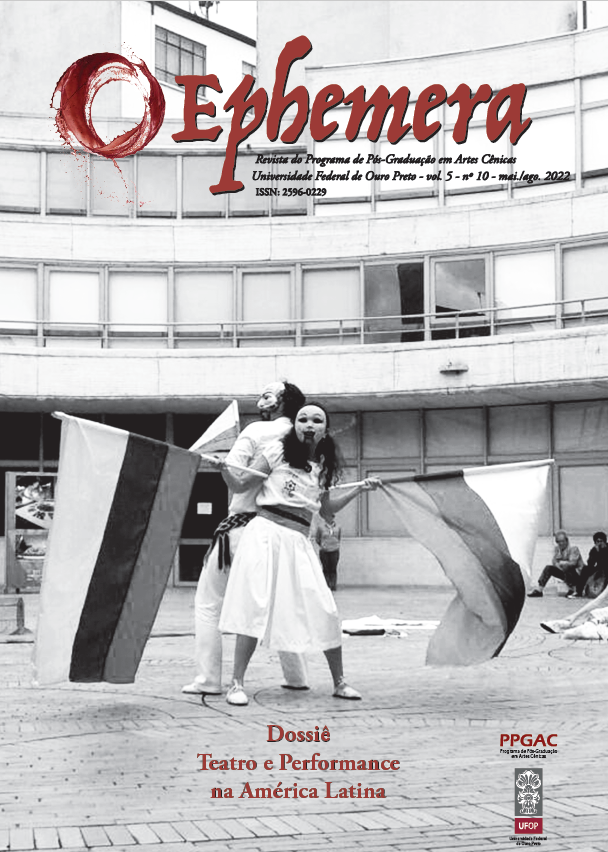Confabulations of women stage directors from Minas Gerais
a brief reflection on the empowerment of women scenic artist in decolonial times
Abstract
This paper briefly presents a critical debate about the role of Brazilian female performing artists, focusing on directors working in the city of Belo Horizonte, Minas Gerais, Brazil. It discusses the work of Cida Falabella, director and actress from Minas Gerais, who also has a long history as an educator and political representative in the city, and the Chilean director, scholar and lecturer Sara Rojo, based in Belo Horizonte for over two decades while working with several groups and artists from Minas Gerais. The manuscript sought to legitimize, make visible, and insert these artists in the history of contemporary Brazilian theater, with the purpose of shining a light a decolonial vision of erasure of women in roles of command and theatrical creation. In addition to this focus, I present, finally, a brief survey of a list of women directors from Minas Gerais, who have worked in the last three decades, as a relevant and necessary initial record for future studies on the subject.
Downloads
References
KILOMBA, Grada. Descolonizando o conhecimento: uma Palestra-Performance. Transcrição, 2018. Tradução Jessica Oliveira. Disponível em https://joaocamillopenna .files.wordpress.com/2018/05/kilomba-grada-ensinando-a-transgredir.pdf. Acesso em 05 de maio de 2022.
ALEXANDRE, Marcos Antônio (org.). Mayombe: arquivos da memória, dramaturgia, pesquisas e práxis cênica. Belo Horizonte: Nandyala, 2011.
ENCICLOPÉDIA Itaú Cultural de Arte e Cultura Brasileiras. CIA. Sonho & Drama (Verbete). São Paulo: Itaú Cultural, 2020. Disponível em https://enciclopedia.itaucultural.org.br/grupo241322/cia-sonho-drama . Acesso em 16 de abr. 2020.
CORDEIRO, Felipe, ROJO, Sara (Org.). Dramaturgias em performance. O deszerto. Classe. Belo Horizonte: Editora Javali, 2020.
CULTURADORIA. Espetáculo A mulher que andava em círculos. Disponível em https://culturadoria.com.br/event/espetaculo-a-mulher-que-andava-em-circulos/. Acesso em 23 de abril de 2020.
DOMINGOS, Clóvis. O caminhar de uma mulher entre o poético e o político. HORIZONTE DA CENA. Disponível em https://www.horizontedacena.com/tag/mayombe/ . Acesso em 23 de abril de 2020.
FALABELLA, Maria Aparecida. De Sonho & Drama a Zap 18: a construção de uma identidade. Belo Horizonte: Escola de Belas Artes da UFMG, 2006. (Dissertação de mestrado).
GABINETONA (website) . https://gabinetona.org/site/ Acesso em 16 de abril de 2020.
IMERSÃO LATINA (website). A imensa minoria, entrevista com Cida Falabella. Disponível em http://www.imersaolatina.com/?page_id=1969. Acesso em 16 de abril de 2020.
FEDERICCI. Gabriel. Haydée Bittencourt: esplendor do teatro. São Paulo: Imprensa Oficial, 2010.
OLIVEIRA, Letícia Mendes. (In)visibilidades e empoderamento das encenadoras no teatro brasileiro. Revista Urdimento, Florianópolis, v.3, n.33, p. 157-173, dez. 2018. Disponível em https://www.revistas.udesc.br/index.php/urdimento/article/view/1414573103332018157/9463 . Acesso em 15 de novembro de 2020.
TIBURI, Márcia. Feminismo em comum: para todas, todos e todes. 11ºed. Rio de Janeiro: Rosa dos Ventos, 2019.
Copyright (c) 2022 https://www.periodicos.ufop.br/pp/index.php/ephemera/information/sampleCopyrightWording

This work is licensed under a Creative Commons Attribution-NonCommercial-NoDerivatives 4.0 International License.
O/As autore/as mantêm os direitos autorais sobre os documentos publicados pelo periódico e cedem ao periódico o direito de publicação dos textos e de seus metadados (em múltiplos suportes e formatos), inclusão em bases de dados e assinatura de acordos de indexação atuais e futuros (mesmo com licenças menos restritivas, para os textos, ou sem restrições, para os metadados), de modo a garantir a indexação do documento publicado e de seus metadados.
O documento publicado será distribuído nos termos da Licença Creative Commons Atribuição - Não-Comercial 4.0 Internacional (CC-BY-NC) que permite o uso, a distribuição e reprodução em qualquer meio desde que sem fins comerciais e que o artigo, os autores e o periódico sejam devidamente citados.



